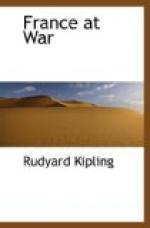We passed into the zone of another army and a hillier country, where the border villages lay more sheltered. Here and there a town and the fields round it gave us a glimpse of the furious industry with which France makes and handles material and troops. With her, as with us, the wounded officer of experience goes back to the drill-ground to train the new levies. But it was always the little crowded, defiant villages, and the civil population waiting unweariedly and cheerfully on the unwearied, cheerful army, that went closest to the heart. Take these pictures, caught almost anywhere during a journey: A knot of little children in difficulties with the village water-tap or high-handled pump. A soldier, bearded and fatherly, or young and slim and therefore rather shy of the big girls’ chaff, comes forward and lifts the pail or swings the handle. His reward, from the smallest babe swung high in air, or, if he is an older man, pressed against his knees, is a kiss. Then nobody laughs.
Or a fat old lady making oration against some wicked young soldiers who, she says, know what has happened to a certain bottle of wine. “And I meant it for all—yes, for all of you —this evening, instead of the thieves who stole it. Yes, I tell you—stole it!” The whole street hears her; so does the officer, who pretends not to, and the amused half-battalion up the road. The young men express penitence; she growls like a thunderstorm, but, softening at last, cuffs and drives them affectionately before her. They are all one family.
Or a girl at work with horses in a ploughed field that is dotted with graves. The machine must avoid each sacred plot. So, hands on the plough-stilts, her hair flying forward, she shouts and wrenches till her little brother runs up and swings the team out of the furrow. Every aspect and detail of life in France seems overlaid with a smooth patina of long-continued war—everything except the spirit of the people, and that is as fresh and glorious as the sight of their own land in sunshine.
A CITY AND WOMAN
We found a city among hills which knew itself to be a prize greatly coveted by the Kaiser. For, truly, it was a pleasant, a desirable, and an insolent city. Its streets were full of life; it boasted an establishment almost as big as Harrod’s and full of buyers, and its women dressed and shod themselves with care and grace, as befits ladies who, at any time, may be ripped into rags by bombs from aeroplanes. And there was another city whose population seemed to be all soldiers in training; and yet another given up to big guns and ammunition —an extraordinary sight.




